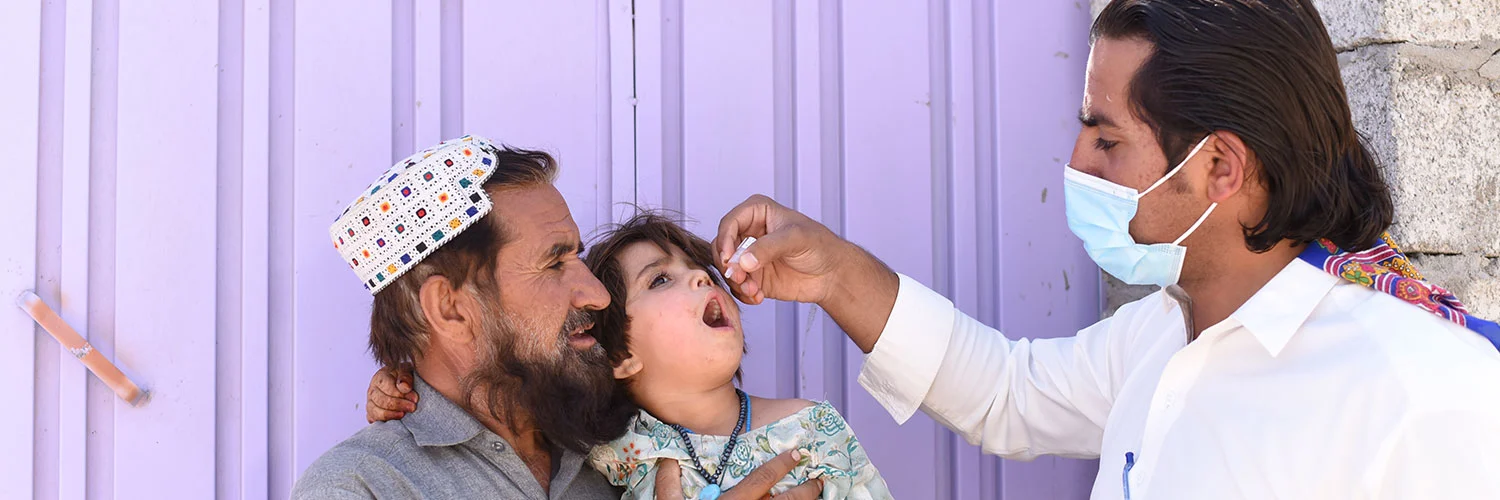ISLAMABAD, APRIL 22, 2022 – A 15-month-old boy was paralyzed by wild poliovirus in the first such case in 15 months. This is the third case of wild polio to be reported globally in 2022.
The type-1 wild poliovirus (WPV1) was confirmed in the child from North Waziristan on 22 April 2022 by the Pakistan National polio laboratory at the NIH, Islamabad, with the onset of paralysis on 9 April. The Pakistan polio laboratory also confirmed detection of a positive environmental sample collected on 5 April 2022, from Bannu district of the same province. Both these viruses are closely related to each other.
Pakistan had reported one case last year with an onset on 27 January 2021 in Killa Abdullah, Balochistan.
“This is, of course, a tragedy for the child and his family and it is also very unfortunate both for Pakistan and polio eradication efforts all over the world. We are disappointed but not deterred,” said Secretary Health Aamir Ashraf. “The case has appeared in Southern Khyber Pakhtunkhwa where the poliovirus was detected in the environment late last year and where an emergency action plan is already being implemented.”
“The National and Provincial Polio Emergency Operations Centres have deployed teams to conduct a full investigation of the recent case, while emergency immunization campaigns are underway to prevent further spread of the wild poliovirus in Pakistan,” the Health Secretary added.
Southern Khyber-Pakhtunkhwa had been identified by the polio programme as the area most at risk after wild poliovirus was detected in environmental samples in the last quarter of 2021. Positive environmental samples of wild poliovirus in Khyber-Pakhtunkhwa had been found in DI Khan and Bannu divisions.
“This validates the programme’s concerns about virus circulation in Southern KP and strengthens our resolve to reach every child with the polio vaccine,” said National Emergency Operations Centre (NEOC) Coordinator Dr Shahzad Baig.
"To address the challenges in Southern KP, the Government and global polio partners had already initiated an emergency action plan to address the challenges in this part of the province,” Dr Baig added.
In 2020, the province of Khyber-Pakhtukhwa reported 22 cases, while no wild poliovirus cases were recorded in the province last year.
Substantial progress has been made recently, with most areas accessible to implement immunization campaigns, but deep-rooted problems and security concerns remain in limited areas. Despite the challenges, the programme’s brave frontline workers continue to reach children with the life-saving vaccine.
Wild poliovirus types 2 and 3 have been eradicated globally, while WPV1 cases are on a historic low. Two other WPV1 cases have been reported this year, one each in Afghanistan and Malawi.
The programme is capitalizing on the momentum gained in the last year and continues to strive for zero-polio. Parents must continue to vaccinate their children during every immunization round until they reach the age of five.
Pakistan remains one of only two countries in the world with circulating wild poliovirus, together with Afghanistan. Polio is a highly infectious virus and until this last remainng epedemiological bloc wipes out polio, childen all over the world remain at risk of life-long parlysis or fatality by the poliovirus.
Note for the Editor:
Polio is a highly infectious disease caused by poliovirus mainly affecting children under the age of five years. It invades the nervous system and can cause paralysis or even death. While there is no cure for polio, vaccination is the most effective way to protect children from this crippling disease. Each time a child under the age of five is vaccinated, their protection against the virus is increased. Repeated immunisations have protected millions of children from polio, allowing almost all countries in the world to become polio-free, besides the two endemic countries of Pakistan and Afghanistan. The next sub-national Polio vaccination campaign is planned to be conducted from 23 – 27 May 2022 in which over 24 million under five children will be targeted for vaccination.
For further information, please contact:
Mr. Zulfiqar Babakhel, Media Manager, NEOC, 0345-9165937
Email: This email address is being protected from spambots. You need JavaScript enabled to view it.

